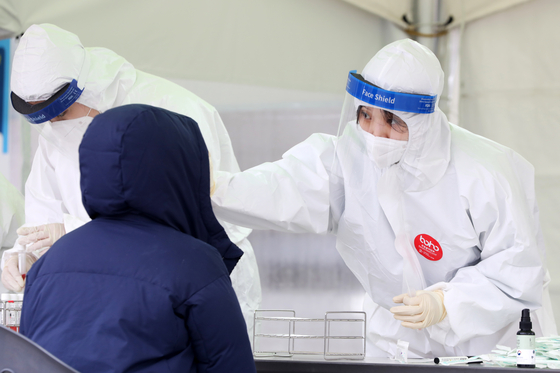
The Korean Society of Epidemiology recently introduced a rapid antigen test to quickly screen confirmed cases of novel coronavirus infection (Corona 19). The photo shows quarantine officials conducting a corona 19 test at a temporary screening test center installed in the Gwangju City Hall Square on the afternoon of the 27th. News 1
The Korean Society of Epidemiology recently requested that the use of a rapid test kit for novel coronavirus infection (Corona 19) be restricted. This is because the accuracy of this test is low, so there is a great concern that it will not be possible to find a real patient.
The Korean Society of Epidemiology (Chairman Dong-Hyun Kim, Professor of Hallym University Medical School) said in a statement on the 27th, “Social and scientific controversy over the rapid antigen test, which is a method of testing for Corona 19, is causing difficulties in quarantine. I want to give it to you.
As the 3rd corona19 pandemic continues, with around 1,000 confirmed cases per day recently, some political circles have argued that all citizens should prepare for self-diagnosis through rapid antigen testing. Together with the Democratic Party’s representative Lee Nak-yeon, at the party’s Supreme Council on the 14th, he argued, “It is time to discuss how to allow anyone to easily perform the first self-test with a quick diagnosis kit and receive additional detailed tests according to the results.
Unlike conventional PCR tests based on gene amplification, rapid antigen test is a method that detects proteins excluding genes, and has the advantage of being able to check the results in about 15 minutes in the field without additional equipment and laboratory, but it has the disadvantage of low accuracy. have. It is used at 150 temporary screening clinics in the metropolitan area.
The Korean Society of Epidemiology said, “According to the results of the rapid antigen test product verification results of the Korean Diagnostic Laboratory Medicine, the sensitivity is estimated to be 41.5% when considering the distribution of the amount of virus in confirmed patients in Korea, unlike the performance presented by the manufacturer.” He pointed out that the sensitivity was only 11% in the sample with a small amount of virus.” Sensitivity refers to the rate at which positives are diagnosed as positive, and if it is only 11%, it means that positives cannot be found properly.
He added, “These results indicate that false negatives (false negatives) are likely to occur in patients with low viral concentrations,” he added. “It is difficult to use rapid antigen testing for the purpose of screening or diagnosing confirmed patients.”
In the case of infectious diseases with high transmission power, such as Corona 19, if there are many false negatives, it may be an additional risk to quarantine. The Korean Society of Epidemiology argued that rapid antigen testing should be used in an emergency or special circumstances where it is difficult to wait for the time required for PCR testing. He added, “In addition to the inaccurate rapid antigen test, there are also tests that shorten the test time and have high accuracy, such as rapid molecular diagnosis.”
In addition, the Korean Society of Epidemiology is to prevent the 3rd pandemic ▶The rapid antigen test should be used as an aid in limited environments such as emergency rooms and nursing facilities ▶Scientific evaluation and guidelines for rapid antigen testing should be prepared ▶Expanded screening clinics and test personnel, etc. Suggested.
Taeyoon Lee [email protected]
